广州版英语四年级下学期单词、短语、重点句
广州市广州版四年级英语下册Unit1 四下短语与知识点归纳
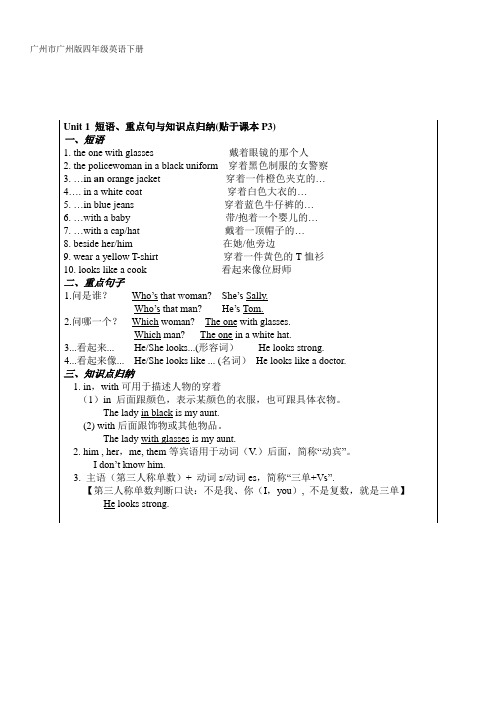
2. him , her,me, them等宾语用于动词(V.)后面,简称“动宾”。
I don’t know him.
3.主语(第三人称单数)+动词s/动词es,简称“三单+Vs”.
【第三人称单数判断口诀:不是我、你(I,you),不是复数,就是三单】
Helooks strong.
广州市广州版四年级英语下册
5.…in blue jeans穿着蓝色牛仔裤的…
6.…witha baby带/抱着一个婴儿的…
7.…with a cap/hat戴着一顶帽子的…
8. beside her/him在她/他旁边
9. wear a yellow T-shirt穿着一件黄色的T恤衫
10.looks likeacook看起来像位厨师
Unit 1短语、重点句与知识点归纳(贴于课本P3)
一、短语
1. theonewith glasses戴着眼镜的那个人
2. thepolicewomanin a black uniform穿着黑色制服的女警察
3.…inanorangejacket穿着一件橙色夹克的…
4….in a white coat穿着白色大hat woman? She’sSally.
Who’sthat man? He’sTom.
2.问哪一个?Whichwoman?The onewith glasses.
Whichman?The onein a white hat.
3...看起来... He/She looks...(形容词)He looks strong.
4...看起来像... He/She looks like ... (名词)He looks like a doctor.
广州市四年级下册英语知识点归纳与练习
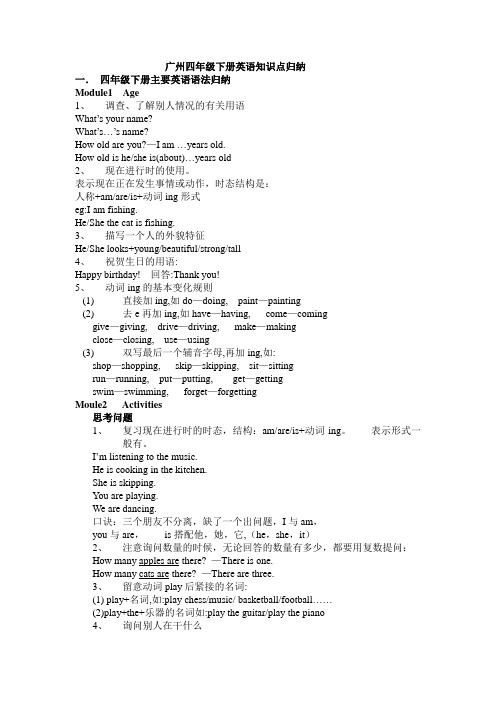
广州四年级下册英语知识点归纳一.四年级下册主要英语语法归纳Module1 Age1、调查、了解别人情况的有关用语What’s your name?What’s…’s name?How old are you?—I am …years old.How old is he/she is(about)…years old2、现在进行时的使用。
表示现在正在发生事情或动作,时态结构是:人称+am/are/is+动词ing形式eg:I am fishing.He/She the cat is fishing.3、描写一个人的外貌特征He/She looks+young/beautiful/strong/tall4、祝贺生日的用语:Happy birthday! 回答:Thank you!5、动词ing的基本变化规则(1)直接加ing,如do—doing, paint—painting(2)去e再加ing,如have—having, come—cominggive—giving, drive—driving, make—makingclose—closing, use—using(3)双写最后一个辅音字母,再加ing,如:shop—shopping, skip—skipping, sit—sittingrun—running, put—putting, get—gettingswim—swimming, forget—forgettingMoule2 Activities思考问题1、复习现在进行时的时态,结构:am/are/is+动词ing。
表示形式一般有。
I’m listening to the music.He is cooking in the kitchen.She is skipping.You are playing.We are dancing.口诀:三个朋友不分离,缺了一个出问题,I与am,you与are,is搭配他,她,它,(he,she,it)2、注意询问数量的时候,无论回答的数量有多少,都要用复数提问:How many apples are there? —There is one.How many cats are there? —There are three.3、留意动词play后紧接的名词:(1) play+名词,如:play chess/music/ basketball/football……(2)play+the+乐器的名词如:play the guitar/play the piano4、询问别人在干什么What are you doing?What is he/she doing?What are they doing?5、告诉别人你热衷的活动,用like/enjoy+动词ing ,如: I like swimming, I enjoy reading.Module 3 Sports思考问题1、注意本模块中出现的短语和句子的中文意思。
广州版小学英语四年级下短语、句型总结

广州版小学英语四年级下短语、句型总结1. 问候和介绍- Hello! - 你好!- Hi! - 嗨!- ___! - 早上/下午/晚上好!- What's your name? - 你叫什么名字?- My name is... - 我叫...- Nice to meet you! - 很高兴认识你!2. 询问和回答问题- How old are you? - 你几岁了?- I am ____ years old. - 我 ____ 岁。
- What is your ___? - 你最喜欢的颜色/食物/动物是什么?- ___... - 我最喜欢的颜色/食物/动物是...3. 表达感受和喜好- I like/love/hate... - 我喜欢/爱/讨厌...- I ___. - 我感到开心/难过/累。
4. 数字和颜色- Numbers: one, two, three, four, five... - 数字:一、二、三、四、五...- Colors: red, blue, yellow, green, purple... - 颜色:红色、蓝色、黄色、绿色、紫色...5. 时间和日期- What time is it? - 现在几点了?- It's ____ o'clock. - 现在是 ____ 点。
- What day is it today? - 今天星期几?- Today is ____ . - 今天是 ____ 。
6. 常用句型- Can you...? - 你能...吗?- Yes, I can. / No, I can't. - 是的,我能。
/不,我不能。
- May I...? - 我可以...吗?- Yes, you may. / No, you may not. - 是的,你可以。
/不,你不能。
7. 家庭成员- mother, father, brother, sister, grandparents - 妈妈、爸爸、哥哥、姐姐、祖父母8. 生活常识- Where is the ___? - 厕所/厨房/教室/公园在哪里?- ___... - 厕所/厨房/教室/公园在...以上是___英语四年级下的一些常用短语和句型,希望对您有所帮助!字数:165个字。
广州版英语四年级下学期单词、短语、重点句
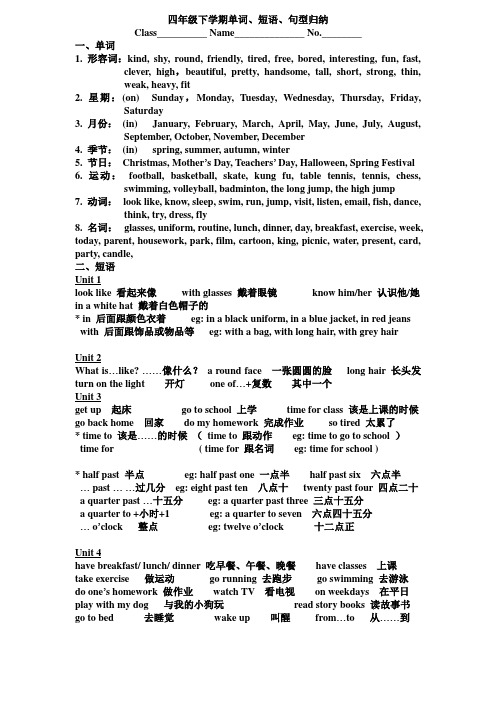
四年级下学期单词、短语、句型归纳Class__________ Name______________ No.________一、单词1. 形容词:kind, shy, round, friendly, tired, free, bored, interesting, fun, fast,clever, high,beautiful, pretty, handsome, tall, short, strong, thin,weak, heavy, fit2. 星期:(on) Sunday,Monday, Tuesday, Wednesday, Thursday, Friday,Saturday3. 月份:(in) January, February, March, April, May, June, July, August,September, October, November, December4. 季节:(in) spring, summer, autumn, winter5. 节日:Christmas, Mother’s Day, Teachers’ Day, Halloween, Spring Festival6. 运动:football, basketball, skate, kung fu, table tennis, tennis, chess,swimming, volleyball, badminton, the long jump, the high jump7. 动词:look like, know, sleep, swim, run, jump, visit, listen, email, fish, dance,think, try, dress, fly8. 名词:glasses, uniform, routine, lunch, dinner, day, breakfast, exercise, week, today, parent, housework, park, film, cartoon, king, picnic, water, present, card, party, candle,二、短语Unit 1look like 看起来像with glasses 戴着眼镜know him/her 认识他/她in a white hat 戴着白色帽子的* in 后面跟颜色衣着eg: in a black uniform, in a blue jacket, in red jeans with 后面跟饰品或物品等eg: with a bag, with long hair, with grey hairUnit 2What is…like? ……像什么?a round face 一张圆圆的脸long hair 长头发turn on the light 开灯one of…+复数其中一个Unit 3get up 起床go to school 上学time for class 该是上课的时候go back home 回家do my homework 完成作业so tired 太累了* time to 该是……的时候(time to 跟动作eg: time to go to school )time for ( time for 跟名词eg: time for school )* half past 半点eg: half past one 一点半half past six 六点半… past ……过几分eg: eight past ten 八点十twenty past four 四点二十a quarter past …十五分eg: a quarter past three 三点十五分a quarter to +小时+1 eg: a quarter to seven 六点四十五分… o’clock 整点eg: twelve o’clock 十二点正Unit 4have breakfast/ lunch/ dinner 吃早餐、午餐、晚餐have classes 上课take exercise 做运动go running 去跑步go swimming 去游泳do one’s homework 做作业watch TV 看电视on weekdays 在平日play with my dog 与我的小狗玩read story books 读故事书go to bed 去睡觉wake up 叫醒from…to 从……到Unit 5favourite day 最喜欢的一天play games 玩游戏have fun 玩得开心*love + 动词ing love singing, love dancing, love skatinglove + 名词love sports, love EnglishUnit 6do housework 做家务clean my room 打扫我的房间go to the park 去公园visit my friends 拜访我的朋友see a film 看电影go shopping 去购物Unit 7do some reading 读点书an interesting book一本有趣的书watch cartoons 看卡通take photos 拍照listen to music 听音乐draw a picture 画画email my friends 发电子邮件给朋友have a picnic 去野餐water the flowers 浇花enjoy the weekend 享受周末Unit 8fish in the park 在公园钓鱼swim in the pool 在泳池游泳fly a kite 放风筝eat in the kitchen 在厨房吃东西play music 玩音乐play cards 打牌sing songs 唱歌surf the Internet 上网go hiking 远足Unit 9play football 踢足球play basketball 打篮球play tennis 打网球play table tennis 打乒乓球do the long jump 跳远do the high jump 跳高do kung fu 打武功play chess 下棋Unit 10take a bath 洗澡play volleyball 打排球run fast 跑得快chess player 棋手jump high 跳得高play well 弹得好Unit 11go on 继续 a birthday party 生日派对Happy birthday 生日快乐all the presents 全部的礼物go on 继续have a party 举行派对was born in+月份出生于……月put…candles on the cake 放蜡烛在蛋糕上Unit 12come soon 快到了like doing for 喜欢做in my home 在我家have a big dinner 吃大餐lots of 许多great food 好的食物dress up 打扮make cards 做卡片for you 给你三、句子1. Which…? The one in/ with…. 哪一个是……? 那个穿着…….。
广州版英语四下单词,短语,句子默写

广州版英语四下单词,短语,句子默写In the fourth grade of primary school, students are required to learn English. As a student in Guangzhou, I will introduce some words, phrases, and sentences in the fourth grade English textbook in Guangzhou.First, let's start with some words. The words in the fourth grade English textbook in Guangzhou include: apple, banana, cat, dog, elephant, fish, and so on. These are basic words that students need to learn and understand in order to build a foundation for their English learning.Next, let's move on to some phrases. In the textbook, students will learn phrases such as "How are you?", "What's your name?", "I'm fine, thank you.", "Good morning.", "Goodbye.", and more. These phrases are essential for students to communicate in English and are commonly used in daily conversations.Now, let's take a look at some sentences. In the fourth grade English textbook in Guangzhou, students will learn sentences like "This is an apple.", "I like bananas.", "What's this?", "It's a cat.", "How many elephants can you see?", and so on. These sentences are designed to help students practice using the words and phrases they have learned in context.In addition to words, phrases, and sentences, the textbook also includes various activities and exercises to help students practice and reinforce their English skills. These activities may include listening exercises, speaking exercises, reading comprehension exercises, and writing exercises. Through these activities, students can further improve their English proficiency.In conclusion, the fourth grade English textbook in Guangzhou covers a wide range of vocabulary, phrases, and sentences that are essential for students to learn and understand. By mastering these words, phrases, and sentences, students can lay a solid foundation for their future English learning. With the help of the textbook's activities and exercises, students can also improve their listening, speaking, reading, and writing skills.Overall, the textbook provides a comprehensive and effective English learning experience for fourth grade students in Guangzhou.。
广州版小学英语四年级下短语、句型汇总
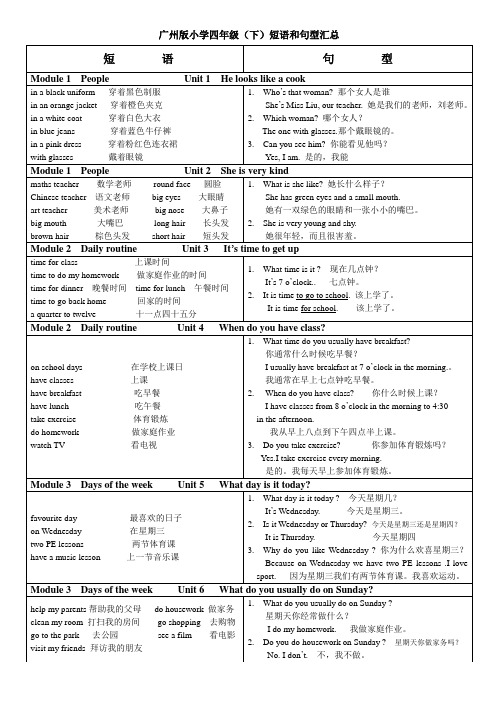
do some reading读点书free time空余时间
take photos照相listen to music听音乐
watch cartoons看卡通片go shopping去购物
draw a picture画画
email my friends给我的朋友发电子邮件
广州版小学四年级(下)短语和句型汇总
短语
句型
Module 1 People Unit 1 He looks like a cook
in a black uniform穿着黑色制服
in an orange jacket穿着橙色夹克
in a white coat穿着白色大衣
in blue jeans穿着蓝色牛仔裤
doning the long jump练习跳远
doning the high jump练习跳高
playing tennis打网球playing chess下棋
1.---What are the children doing in the playground?
孩子们正在操场上干什么?
---They are playing basketball and football.
我们喜欢吃一顿丰盛的家庭晚餐。
2.---My dad likes dressing up as Father Chirstmas.
我爸爸喜欢装扮成圣诞老人。
3.---Here’s one for you.这张是给你的。
---Thanks.多谢。
in a pink dress穿着粉红色连衣裙
with glasses戴着眼镜
1.---Who’s that woman?那个女人是谁
广州版英语四年级下学期全册知识点归纳

Unit 1: Places- Vocabulary: bank, hospital, library, post office, supermarket- Sentence patterns: Where is the _____? It’s near the_____.- Grammar: Prepositions of place (on, in, near, next to)Unit 2: Activities- Vocabulary: draw, read, swim, write, play- Sentence patterns: What do you want to do? I want to _____.- Grammar: Verbs of activities in the present tenseUnit 3: Healthy Lifestyle- Vocabulary: breakfast, lunch, dinner, fruit, vegetables- Sentence patterns: What do you have for _____? I have_____ for _____.- Grammar: Count and non-count nounsUnit 4: Seasons and Weather- Vocabulary: spring, summer, autumn, winter, sunny, rainy, cloudy, windy- Sentence patterns: What’s the weather like today? It’s_____.- Grammar: Adjectives to describe seasons and weatherUnit 5: Sports- Vocabulary: basketball, football, swimming, running- Sentence patterns: Do you like _____? Yes, I do. / No, I don’t.- Grammar: Verbs to express likes and dislikesUnit 6: Daily Routines- Vocabulary: get up, have breakfast, go to school, have lunch, go home, go to bed- Grammar: Present simple tense for daily routinesUnit 7: Food and Drinks- Vocabulary: noodles, rice, bread, milk, juice- Sentence patterns: What would you like to eat/drink? I would like some _____.- Grammar: Countable and non-countable nouns for food and drinksUnit 8: Clothes- Vocabulary: hat, coat, shirt, dress, trousers- Sentence patterns: What are you wearing? I’m wearing a _____.- Grammar: Articles (a, an, the)Unit 9: My Family- Vocabulary: father, mother, brother, sister, grandparents- Sentence patterns: How many _____ do you have? I have_____.- Grammar: Plural form of nounsUnit 10: My School- Sentence patterns: What’s in the _____? There is a _____.- Grammar: There is / There areUnit 11: My Hobbies- Vocabulary: dancing, singing, painting, playing chess, playing the piano- Sentence patterns: What do you like doing? I like _____.- Grammar: Verbs ending in -ingUnit 12: Animals- Vocabulary: lion, elephant, rabbit, monkey, panda- Sentence patterns: Have you ever seen a _____? Yes, I have. / No, I haven’t.- Grammar: Present perfect tense for experiencesUnit 13: Festivals- Vocabulary: Spring Festival, Lantern Festival, Dragon Boat Festival, Mid-Autumn Festival, Christmas- Sentence patterns: How do you celebrate _____? We _____.- Grammar: Simple past tense for activities in the past- Vocabulary: park, museum, theater, shop, zoo- Sentence patterns: What can you do in the _____? We can_____.- Grammar: Modal verbs (can, could)Unit 15: Transportation- Vocabulary: bus, taxi, subway, train, bike- Sentence patterns: How do you get to _____? I _____.- Grammar: Verbs of transportation (take, ride)以上是广州版英语四年级下学期全册的知识点归纳,包括词汇、句型和语法。
广东版开心学英语四年级下册全套重点单词、词组和句子复习资料整理
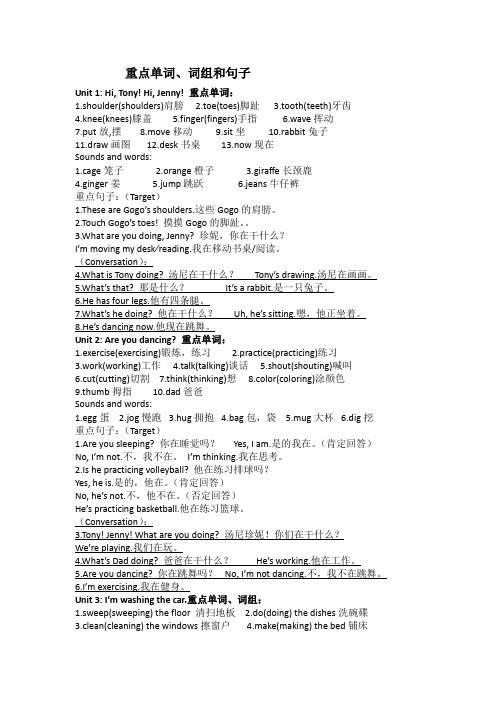
重点单词、词组和句子Unit 1: Hi, Tony! Hi, Jenny! 重点单词:1.shoulder(shoulders)肩膀2.toe(toes)脚趾3.tooth(teeth)牙齿4.knee(knees)膝盖5.finger(fingers)手指6.wave挥动7.put放,摆8.move移动9.sit坐10.rabbit兔子11.draw画图12.desk书桌 13.now现在Sounds and words:1.cage笼子2.orange橙子3.giraffe长颈鹿4.ginger姜5.jump跳跃6.jeans牛仔裤重点句子:(Target)1.These are Gogo’s shoulders.这些Gogo的肩膀。
2.Touch Gogo’s toes! 摸摸Gogo的脚趾。
3.What are you doing, Jenny? 珍妮,你在干什么?I’m moving my desk∕reading.我在移动书桌/阅读。
(Conversation):4.What is Tony doing? 汤尼在干什么?Tony’s drawing.汤尼在画画。
5.What’s that? 那是什么?It’s a rabbit.是一只兔子。
6.He has four legs.他有四条腿。
7.What’s he doing? 他在干什么?Uh, he’s sitting.嗯,他正坐着。
8.He’s dancing now.他现在跳舞。
Unit 2: Are you dancing? 重点单词:1.exercise(exercising)锻炼,练习2.practice(practicing)练习3.work(working)工作4.talk(talking)谈话5.shout(shouting)喊叫6.cut(cutting)切割7.think(thinking)想8.color(coloring)涂颜色9.thumb拇指10.dad爸爸Sounds and words:1.egg蛋2.jog慢跑3.hug拥抱4.bag包,袋5.mug大杯6.dig挖重点句子:(Target)1.Are you sleeping? 你在睡觉吗?Yes, I am.是的我在。
知识归纳-广州版小学英语四年级下册
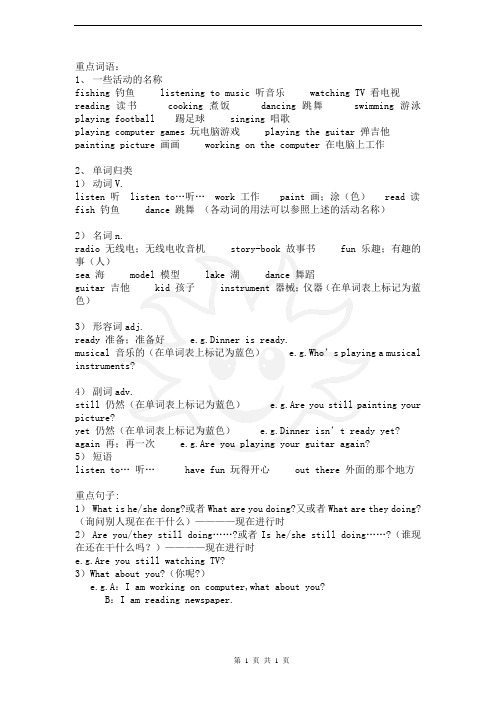
重点词语:1、一些活动的名称fishing 钓鱼 listening to music 听音乐 watching TV 看电视reading 读书cooking 煮饭dancing 跳舞swimming 游泳playing football 踢足球 singing 唱歌playing computer games 玩电脑游戏 playing the guitar 弹吉他painting picture 画画 working on the computer 在电脑上工作2、单词归类1)动词V.listen 听 listen to…听… work 工作 paint 画;涂(色) read 读fish 钓鱼 dance 跳舞(各动词的用法可以参照上述的活动名称)2)名词n.radio 无线电;无线电收音机 story-book 故事书 fun 乐趣;有趣的事(人)sea 海 model 模型 lake 湖 dance 舞蹈guitar 吉他 kid 孩子 instrument 器械;仪器(在单词表上标记为蓝色)3)形容词adj.ready 准备;准备好 e.g.Dinner is ready.musical 音乐的(在单词表上标记为蓝色) e.g.Who’s playing a musical instruments?4)副词adv.still 仍然(在单词表上标记为蓝色) e.g.Are you still painting your picture?yet 仍然(在单词表上标记为蓝色) e.g.Dinner isn’t ready yet? again 再;再一次 e.g.Are you playing your guitar again?5)短语listen to…听… have fun 玩得开心 out there 外面的那个地方重点句子:1)What is he/she dong?或者What are you doing?又或者What are they doing?(询问别人现在在干什么)————现在进行时2)Are you/they still doing……?或者Is he/she still doing……?(谁现在还在干什么吗?)————现在进行时e.g.Are you still watching TV?3)What about you?(你呢?)e.g.A:I am working on computer,what about you?B:I am reading newspaper.第 1 页共 1 页。
广州版四年级下册英语全册知识点归纳
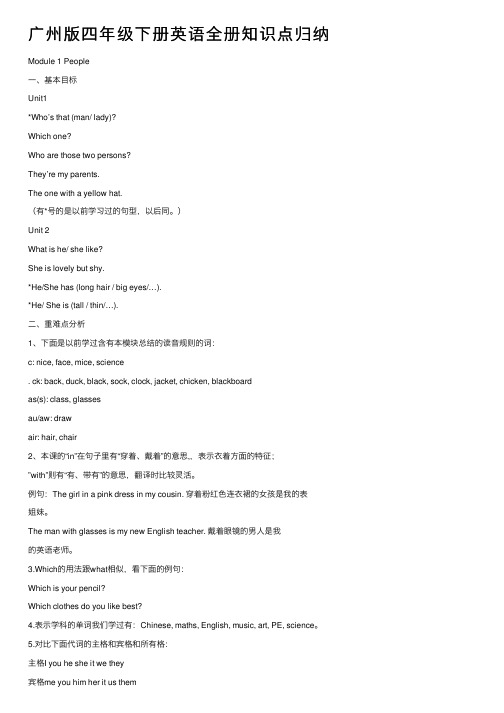
⼴州版四年级下册英语全册知识点归纳Module 1 People⼀、基本⽬标Unit1*Who’s that (man/ lady)?Which one?Who are those two persons?They’re my parents.The one with a yellow hat.(有*号的是以前学习过的句型,以后同。
)Unit 2What is he/ she like?She is lovely but shy.*He/She has (long hair / big eyes/…).*He/ She is (tall / thin/…).⼆、重难点分析1、下⾯是以前学过含有本模块总结的读⾳规则的词:c: nice, face, mice, science. ck: back, duck, black, sock, clock, jacket, chicken, blackboardas(s): class, glassesau/aw: drawair: hair, chair2、本课的“in”在句⼦⾥有“穿着、戴着”的意思,,表⽰⾐着⽅⾯的特征;”with”则有“有、带有”的意思,翻译时⽐较灵活。
例句:The girl in a pink dress in my cousin. 穿着粉红⾊连⾐裙的⼥孩是我的表姐妹。
The man with glasses is my new English teacher. 戴着眼镜的男⼈是我的英语⽼师。
3.Which的⽤法跟what相似,看下⾯的例句:Which is your pencil?Which clothes do you like best?4.表⽰学科的单词我们学过有:Chinese, maths, English, music, art, PE, science。
5.对⽐下⾯代词的主格和宾格和所有格:主格I you he she it we they宾格me you him her it us them所有格my your his her its our their注意主格与宾格⽤法的不同,宾格⼀般⽤与动词后⾯或介词后⾯,如:Show me your books, please.This book is for him.6. 注意art, English, old, eye, ear等词前⽤an表⽰⼀个、只、条、..., ⽽不⽤a, 例如:an art teacher, an English teacher, an old man,an eye, an earModule 2 Daily routine⼀、基本⽬标Unit 31) What time is it?It’s seven thirty.2) It’s time for breakfast/ to have breakfast/3) It's time to go to sleep4) *Let’s go to school.Unit 41) We get up a t (eight o’clock).2) We have lessons from eight in the morning to four in the afternoon.⼆、重、难点分析1、下⾯是以前学过含有本模块总结的读⾳规则的词:g: good, grape, grow, gardeng: gym, orange, largeea: head, heavyey: they, greyer: mother, teacher, farmer, driver, writer, painter, reporter, sweater, number, mother, father, sister, brother, computer, winner. grandmother, grandfather ear: ear, near ear: bear, pearere: here ere: there, where2、It’s time for 后⾯跟名词,⽽It’s time to后⾯跟动词,如:It’s time for bed/ school/ class/ breakfast/ lunch/ dinner。
(完整版)广州版四年级英语下册单词带音标

photo [ˈfəutəu] 照片year [jɪr] 年year(s) old ………岁look [luk] 看起来younger [ˈjʌŋɡə] 较年轻,更年轻tell [tel] 告诉,讲truth [tru:θ] 事实,真相to tell you the truth 老实告诉你secret [ˈsi:krit] 秘密teenager [ˈti:neidʒə] 十几岁的少年baby [ˈbeibi] 婴儿child [tʃaild] 小孩person [ˈpə:sən] 人sing [siŋ] 唱歌so [səu] 因此,如此excited [ɪkˈsaɪtɪd] 激动的happy [ˈhæpi] 高兴的happy birthday 生日快乐computer game 计算机游戏thank you so much 非常感谢你forget [fəˈɡet]忘记something [ˈsʌmθiŋ] 一些东西,某些really [ˈriəli] 真正地grandpa [ˈɡrænpɑ:] 爷爷joke [dʒəuk] 开玩笑,笑话only joking 开玩笑而已give [ɡiv]给her [hə:] 她(宾格)card [kɑ:d]卡song [sɔŋ]歌,歌曲blow [bləu] 吹blow out 吹灭candle [ˈkændl]蜡烛cut [kʌt] 砍,切eat [i:t] 吃party [ˈpɑ:ti]聚会listen [ˈlisn]听listen to 听………radio [ˈreidiəu] 无线电,无线收音机guitar [ɡiˈtɑ:]吉他still [stil] 仍然work [wə:k] 工作paint [peint] 画;涂色read [ri:d] 读story book 故事书ready [ˈredi]准备,准备好yet [jet] 仍然again [əˈɡen] 再,再一次fish [fiʃ] 钓鱼kid [kɪd] 小孩fun [fʌn] 有趣的have fun [hæv fʌn] 玩得开心out there [aut ðεə] 到战场,在那里sea [si:] 海,海洋musical ['mju:zikəl] 音乐的,爱好音乐的instrument ['instrumənt] 工具;器械;乐器model ['mɔdəl] 模型;模范;模特儿dance ['dɑ:ns] 跳舞lake [leɪk] 湖Slowly [ˈsləʊlɪ] 慢慢地get [ɡet]得到,获得baton [ˈbætn]接力棒fast [fɑ:st]快的,快地catch [kætʃ] 抓住,捉住catch up 赶上go for it 快点,努力wave [weiv] 挥动across [əˈkrɔs] 横过field [fi:ld] 运动场地,田野fall [fɔ:l] 落下,降下,跌倒fall over 跌倒team [ti:m] 队winner [ˈwɪnə] 获胜者high [hai] 高的,高高地high jump 跳高long jump 跳远pupil [ˈpju:pəl] 学生reporter [riˈpɔ:tə] 记者good [ɡud]好的be good at 善于……,在…….方面有特长medal [ˈmedəl] 奖章36th(the thirty-sixty) 第36个(次...)championship ['tʃæmpiənʃip] 锦标赛;冠军称号the 36th World [wə:ld] Table Tennis Championship ['tʃæmpiənʃip] 第三十六届世界乒乓球锦标赛Olympic [əuˈlɪmpɪk] games 奥林匹克运动会also [ˈɔ:lsəu] 也gold [ɡəuld]金well done 干(做)得好weight-lifting 举重setter [ˈsetə] 创造者record [riˈkɔ:d] 记录Asian [ˈeɪʃən] 亚洲的Asian Games 亚洲运动会Here we come 我们来啦low [ləu] 低的badly [ˈbædli]坏,不好地favourite [ˈfeɪvərɪt] 最喜欢的,最喜爱的sure [ʃuə] 确信的,肯定地parent [ˈpeərənt] 父(母)亲will [wil] 将,会play [plei] 戏剧boring [ˈbɔ:riŋ]厌烦的wrong [rɔŋ]错的What’s wrong? 出什么事了?part [pɑ:t]部分,角色important [imˈpɔ:tənt] 重要的interesting [ˈintristiŋ] 有趣的uniform [ˈju:nifɔ:m] 制服does [dʌz] (助动词,没有实际意义)doesn't=dose not 不fairy [ˈf eəri] 仙女need [ni:d] 需要lady [ˈleidi]女士gentleman [ˈdʒentlmən] 男士gentlemen [ˈdʒentlmən] 男士(复数)enjoy [ɪn'dʒɔɪ] 欣赏;享受…之乐趣;喜concert [ˈkɔnsət] 音乐会film [film] 电影programme [ˈprəu-ɡræm]节目news [nju:z] 新闻cartoon [kɑ:ˈtu:n]卡通,漫画open [ˈəupən] 打开(电器)mickey [ˈmiki] mouse [maus] 米老鼠Donald [dɔnld] duck [dʌk] 唐老鸭show [ʃəu] 展览,展示CD 光盘Would you like……..你愿意……吗?coffee [ˈkɔfi] 咖啡coke [kəʊk] 可乐porridge [ˈpɔ:rɪdʒ] 粥noodle [ˈnu:dl]面条rice noodle 米粉bun [bʌn] 小(圆)包,馒头best [best] 最,最好的dim-sum 点心piece [pi:s] 片toast [təust] 烤面包,吐司bowl [bəul] 碗bottle [ˈbɔtl] 瓶cup [kʌp] 杯tea [ti:] 茶plate [pleit] 碟water [ˈwɔ:tə] 水juice [dʒu:s] 汁fried [fraid] 油炸的,炒的chips [tʃips] 炸薯条sandwich [ˈsænwidʒ] 三文治delicious [diˈliʃəs] 好吃的,美味的dumpling [ˈdʌmplɪŋ]饺子starter [ˈstɑ:tə]第一道菜know [nəu] 知道,认识cabbage [ˈkæbidʒ] 洋白菜,甘蓝,包心菜soup [su:p] 汤salad [ˈsæləd] 色拉,凉拌菜either [ˈaiðə] 也(用于否定句)nothing [ˈnʌθiŋ]没有东西,没事pasta [ˈpɑ:stə]意大利粉hamburger 汉堡包problem [ˈprɔbləm] 问题menu [ˈmenju:]菜单roast [rəust] 烤的main [mein] course [kɔ:s] 主食dessert [diˈzə:t] 甜品tomato [təˈmɑ:təu] 西红柿beef [bi:f] 牛肉beefsteak [ˈbi:fsteik]牛扒ice [ais] cream [kri:m] 冰激凌chocolate [ˈtʃɔkəlit] 巧克力chicken [ˈtʃikin] 鸡肉vendor [ˈvendə] 小贩customer [ˈkʌstəmə] 顾客carrot [ˈkærət] 胡萝卜dollar [ˈdɔlə] 元kilo [ˈkiləu] 公斤half [hɑ:f]半half [hɑ:f]任何事情(东西)else [els] 别的,其他的Anything else ['eniθiŋ els] 别的东西Fresh [freʃ] 新鲜的;精神饱满的cost [kɔst] 值(多少钱);花费cent [sent] 分;一分的硬币;森特(等That's it [ðæts it] 就是这样Let's see [lets si:] 让我们看看change [tʃeindʒ] 改变;交换potato [pə'teɪtəu] 土豆,马铃薯pepper ['pepə] 胡椒(粉);辣椒粉mushroom ['mʌʃrʊm] 蘑菇broccoli ['brɔkəlɪ] 花椰菜onion ['ʌnjən] 洋葱;洋葱头vegetable [ˈvedʒitəbl] 蔬菜fruit [fru:t] 水果next [nekst] 下一个pizza [ˈpitsə] 意大利薄饼grape [ɡreip]葡萄banana [bəˈnɑ:nə]香蕉cheap [tʃi:p] 便宜的cheaper 更便宜的。
广州版四年级英语单词、短语、课文默写
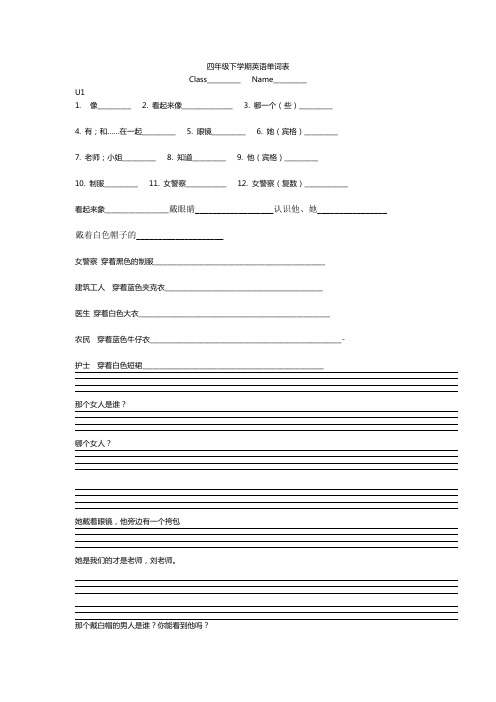
四年级下学期英语单词表Class__________ Name__________U11.像__________2. 看起来像_______________3. 哪一个(些)__________4. 有;和……在一起__________5. 眼镜__________6. 她(宾格)__________7. 老师;小姐__________ 8. 知道__________ 9. 他(宾格)__________10. 制服__________ 11. 女警察____________ 12. 女警察(复数)_____________看起来象___________________戴眼睛__________________认识他、她________________ 戴着白色帽子的____________________女警察穿着黑色的制服___________________________________________________建筑工人穿着蓝色夹克衣_______________________________________________医生穿着白色大衣_________________________________________________________农民穿着蓝色牛仔衣_________________________________________________________-护士穿着白色短裙______________________________________________________哪个女人?她戴着眼镜,他旁边有一个挎包她是我们的才是老师,刘老师。
那个戴白帽的男人是谁?你能看到他吗?是的,但我认识他,他看起来像个厨师。
U21.和蔼的,慈祥的__________2. 害羞的__________3. 圆的__________4. 友好的__________5. ……像什么?___________________ ?....像什么________________ 一张圆圆的脸__________________________长头发_______________陈老师,数学老师,圆脸,大眼睛、大鼻子、高兴的李小姐,语文老师,长发,高,瘦,美丽张先生,棕色头发,大鼻子,大嘴巴,强壮的,和蔼的王女士,美术老师,短发,矮的,美丽的,友好的朋友,圆脸,长发,矮的,可爱的新来的英语老师在教师办公室里。
四年级下册广州版英语知识点

四年级下册广州版英语知识点总结一、词汇1. 颜色类词汇:red, blue, yellow, green, black, white等。
2. 动物类词汇:cat, dog, rabbit, panda, lion, tiger等。
3. 数字类词汇:one, two, three, four, five, six等。
4. 食物类词汇:apple, banana, orange, cake, pie等。
5. 家庭成员类词汇:father, mother, brother, sister等。
6. 其他常见词汇:happy, sad, tired, excited等表示情感的词汇;book, pen, ruler等学习用品词汇;bird, fly, swim等表示动作的词汇等。
二、语法1. 主谓宾结构:学生需要掌握基本的句子结构,如“I am a student.”(我是学生。
)其中“I”是主语,“am”是谓语,“a student”是宾语。
2. 形容词和副词:学生需要了解形容词和副词的作用和使用方法。
例如,“I am happy.”(我很高兴。
)中的“happy”是形容词,用于描述主语的状态或特征;而副词则通常用于描述动作的方式或频率,例如“I run fast.”(我跑得快。
)中的“fast”是副词。
3. 介词:学生需要了解一些常用介词的用法,如“in”、“on”、“under”、“next to”等。
例如,“The book is on the table.”(书在桌子上。
)中的“on”表示位置关系。
4. 连词:学生需要了解一些常用连词的用法,如“and”、“but”、“or”等。
例如,“I like apples and bananas.”(我喜欢苹果和香蕉。
)中的“and”表示并列关系;“I want to go to the park but it’s raining.”(我想去公园,但是下雨了。
四年级下册英语素材词汇表广州版

四年级下册英语素材词汇表广州版Unit 1 He looks like a cooklike 像look like 看起来像...which 哪一(个);哪一些with 有;和...在一起glasses 眼镜her 她(宾格)Miss 老师;小姐know 明白him 他(宾格)policewoman 女警察policewomen 女警察(复数)uniform 降服Unit 2 She is very kindkind 和气的;慈爱的What is...like?...像什么shy 害羞的round 圆的friendly 友好的Unit 3 It’s time to get updaily 日常的;每日routine 固定的程序;常规time 时刻It’s time to/for...是...的时候了up 向上get up 起床o’clock ...点钟half 一半的past 过去的;过去half past.. ....点半quarter 一刻,十五分钟to 差...到.....(点钟)a quarter to... ....点四十五分(差一刻钟到...点)sleep 睡觉tired 疲乏的lunch 午餐back 回home 家dinner 晚餐Unit 4 When do you have class?usually 通常well 好day 天,日breakfast 早餐at 在from 从from...to.... 从...到..exercise 练习take exercise 体育锤炼run 跑步go running 去跑步swim 游泳Unit 5 What day is it today?week 周末today 今天Wednesday 星期三Thursday 星期四why 什么缘故Sunday 星期天Monday 星期一Tuesday 星期二Friday 星期五Saturday 星期六Unit 6 What do you usually do on Sunday?always 总是parent 父(母)亲housework 家务never 从来不often 经常go shopping 去购物park 公园visit 参观film 电影Unit 7 What do you when you have free time ? free 闲暇的;自由的feel 感受bored 烦闷的Me too. 我也是do some reading 读点书interesting 有味的cartoon 漫画shall 将要Shall we...? 我们...好吗?king 国王Monkey King猴王take photos 拍照listen to... 听....email 发电子邮件;电子邮件picnic 野餐Unit 8 What are you doing? have a look 看一下fish 钓鱼fly 放(风筝);飞dance 跳舞Unit 9 It looks funfun 有味baskeball 篮球football 足球kung fu 功夫;武术think 想skate 溜冰try 试;尝试table tennis 兵乓球jump 跳the long jump 跳远hight 高的;高地the high jump 跳高tennis 网球chess (国际)象棋Unit 10 I am very fast arm 手臂velleyball 排球fast 快的;飞速地water 水bath 洗澡take a bath 洗澡clever 聪慧的badminton 羽毛球Unit 11 I was born in January celebration 庆祝January 一月present 礼物card 卡;卡片go on 进行party 聚会was 是(is,am的过去式)candle 蜡烛be born... 生于cake 蛋糕February 二月March 三月April 四月August 八月June 六月November 十一月Unit 12 Christmas is coming Christmas 圣诞节December 十二月already 差不多soon 不久lot 许多lots of 许多的;大量的dress 穿着as 如;像Father Christmas 圣诞老人July 七月summer 夏天holiday 假日May 五月Mother’s Day 母亲节一样说来,“教师”概念之形成经历了十分漫长的历史。
广州版小学英语四年级下册单词及音标学习
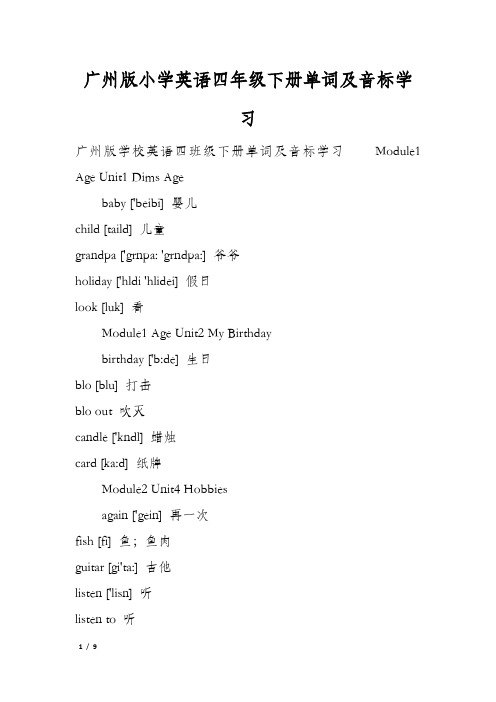
广州版小学英语四年级下册单词及音标学习广州版学校英语四班级下册单词及音标学习Module1 Age Unit1 Dims Agebaby ['beibi] 婴儿child [taild] 儿童grandpa ['grnpa: 'grndpa:] 爷爷holiday ['hldi 'hlidei] 假日look [luk] 看Module1 Age Unit2 My Birthdaybirthday ['b:de] 生日blo [blu] 打击blo out 吹灭candle ['kndl] 蜡烛card [ka:d] 纸牌Module2 Unit4 Hobbiesagain ['gein] 再一次fish [fi] 鱼;鱼肉guitar [gi'ta:] 吉他listen ['lisn] 听listen to 听paint [peint] 绘画radio ['reidiu] 收音机read [ri:d] 读ready ['redi] 预备好still [stil] 仍旧story-book 故事书ork [:k] 工作yet [jet] 仍旧Module2 Unit5 What the Aliens Enjoy Doingdance ['da:ns] 跳舞fun [fn] 乐趣;消遣have fun 玩得快乐instrument ['instrumnt] 乐器kid [kid] 小孩;开玩笑lake [leik] ['leik] 湖model ['mdl] 模型musical ['mju:zikl] 音乐的musical instrument 乐器out there 外面的那个地方sea [si:] 海洋Module3 Unit7 School Sports Dayacross ['krs] 穿过baton ['btn] 接力棒catch [kt] 接住;捉住catch up 赶上fall [f:l] 降落;倒下fall over 跌倒fast [fa:st] 快的field [fi:ld] 田地;牧场get [get] 成为;得到go for it 快点;努力high [hai] 高的high jump 跳高long jump 跳远sloly ['slul] 慢地team [ti:m] 队ave [eiv] 波动inner ['in] 获胜者Module3 Unit8 Sports Starsalso [':lsu] 也badly ['bdli] 坏be good at 擅长championship ['tmpjnip] 锦标赛favourite ['feivrit] 宠爱的gold [guld] 黄金good [gud] 好Here e come 我们来啦lo [lu] 低;矮medal ['medl] 奖牌record ['rek:d] 记录reporter [ri'p:t] 记者setter ['set] 缔造者eight-lifting 举重Well done 干(做)得好Module4 Unit10 A School Playboring ['b:ri] 无聊的;令人厌烦的concert ['knst] 音乐会does [dz; dz] 做doesn't 不做enjoy [in'di] 观赏fairy ['fri] 仙女film [film] 电影gentleman ['dentlmn] 绅士gentlemen ['dentlmn] 男士important [im'p:tnt] 重要的interesting ['intristi] 好玩的lady ['leidi] 女士need [ni:d] 需要parent ['prnt] 双亲part [pa:t] 部分;成分play [plei] 玩programme ['prugrm] 节目;项目sure [u] 确信uniform ['ju:nif:m] 制服What's rong 怎么了ill [il l l l] 情愿;要rong [r] 错误的广州版学校英语四班级下册单词及音标学习Module4 Unit11 Radio and Televisioncartoon [ka:'tu:n] 动画片CD 光盘Donald Duck 唐老鸭Micky Mouse 米老鼠nes [nju:z] 新闻sho [u] 展现;演出turn on 打开Module5 Unit13 The Food and Drink We Likebest [best] 最好的bottle ['btl] 瓶子bol [bul] 碗bun [bn] 馒头chips [tips] 炸土豆条coffee ['kfi] 咖啡coke [kuk] [kuk kuk] 可乐cup [kp] 杯子delicious [di'lis] 美味的dim-sum 点心dumpling ['dmpli] 饺子fried [fraid] [fri:d] 油煎的horrible ['hrbl] 恐怖的juice [du:s] 汁;液noodles 面条piece [pi:s] 一块plate [pleit] 盘子porridge ['prid] 粥rice noodles 米粉sandich ['snid -t] ['snit -d] 三明治tea [ti:] 茶toast [tust] 吐司ater [':t] 水Would you like... 你情愿吗Module5 Unit14 School Lunchbeef [bi:f] 牛肉beefsteak ['bi:fstek] 牛扒cabbage ['kbid] 洋白菜chicken ['tikin] 鸡;鸡肉chocolate ['tklit] 巧克力dessert [di'z:t] 甜点either ['a(r)] 二者之一;要么hamburger ['hmb:g] 汉堡包ice cream 冰淇淋kno [nu] 知道main course 主食nothing ['ni] 没有什么pasta ['pa:st] 意大利粉problem ['prblm] 问题roast [rust] 烤(肉)salad ['sld] 色拉soup [su:p] 汤tomato [t'ma:tu t'meitu] 西红柿Module6 Unit16 In the Marketanything ['enii] 任何事(物)broccoli ['brkli] 花椰菜carrot ['krt] 胡萝卜cent [sent] 美分change [teind] 零钱cost [kst] 花费dollar ['dl] 美元else [els] 别的fresh [fre] 新奇的half [ha:f] 半;一半kilo ['ki:lu'k-] 千克;千米Let's see 让我们想想mushroom ['mrum] 蘑菇onion ['njn] 洋葱pepper ['pep] 辣椒粉potato [p'teitu] 土豆That's it 就这些vendor ['vend:] 卖主Module6 Unit17 The Vegetables and Fruits We Need banana [b'na:n] 香蕉cheap [ti:p] 廉价的cheaper 更廉价的fruit [fru:t] 水果grape [greip] 葡萄next [nekst] 紧挨着的pizza ['pi:ts] 比萨饼vegetable ['veditbl] 蔬菜。
(完整版)新广州版四年级英语下重点知识

Unit1 He looks like a cook重点词汇Like look like which withGlasses know her himPolicewoman policewomen uniform重点句型1.He looks like a cook. 他看起来像厨师。
拓展:She looks like...I look like..... They look like .... We look like ....2.Who’s that woman/ man? 那个妇女/男的是谁拓展:Who’s that man with glasses?3.And that man in a white hat? 戴白色帽子的男人是谁?拓展:Who’s that man in blue jeans ?4. I don’t know him. 我不知道他或我不认识他。
I don’t know.语法:Look like 看起来像。
通常指外表看来像Like 为介词,当主语为第三人称单数时,look要加sThe one with glasses.With 有。
带有。
介词,不能做谓语表示修饰Beside 介词在。
旁边同义的短语还有next to , near , close toAnd that man in a white hat?In a white hat 表示“带着白色帽子的”in + 颜色,表示“穿着。
颜色的衣服”In red T-shirt in a blue jacket in a black uniform熟悉有关职业的单词:cook teacher policewoman builderdoctor nurse farmer athletepainter pilot worker firemanActor actress driver scientist掌握复数形式的名词Glasses 眼镜jeans 牛仔裤shoes 鞋子Trousers 裤子这些词要表示数量时,要加量词,通常用 a pair of glasses / jeans /trousers /shortspolicemen 男警察policewomen 女警察Unit 2 she is very kind重点词汇Kind what is .... Shy round friendly重点句型She is very kind.What is she like?She has green eyes and a small mouth?And she is very young and shy.语法What is she like ? 询问某人的外表怎么样?回答时通常要描述人的外貌特征。
- 1、下载文档前请自行甄别文档内容的完整性,平台不提供额外的编辑、内容补充、找答案等附加服务。
- 2、"仅部分预览"的文档,不可在线预览部分如存在完整性等问题,可反馈申请退款(可完整预览的文档不适用该条件!)。
- 3、如文档侵犯您的权益,请联系客服反馈,我们会尽快为您处理(人工客服工作时间:9:00-18:30)。
四年级下学期单词、短语、句型归纳Class__________ Name______________ No.________一、单词1. 形容词:kind, shy, round, friendly, tired, free, bored, interesting, fun, fast,clever, high,beautiful, pretty, handsome, tall, short, strong, thin,weak, heavy, fit2. 星期:(on) Sunday,Monday, Tuesday, Wednesday, Thursday, Friday,Saturday3. 月份:(in) January, February, March, April, May, June, July, August,September, October, November, December4. 季节:(in) spring, summer, autumn, winter5. 节日:Christmas, Mother’s Day, Teachers’ Day, Halloween, Spring Festival6. 运动:football, basketball, skate, kung fu, table tennis, tennis, chess,swimming, volleyball, badminton, the long jump, the high jump7. 动词:look like, know, sleep, swim, run, jump, visit, listen, email, fish, dance,think, try, dress, fly8. 名词:glasses, uniform, routine, lunch, dinner, day, breakfast, exercise, week, today, parent, housework, park, film, cartoon, king, picnic, water, present, card, party, candle,二、短语Unit 1look like 看起来像with glasses 戴着眼镜know him/her 认识他/她in a white hat 戴着白色帽子的* in 后面跟颜色衣着eg: in a black uniform, in a blue jacket, in red jeans with 后面跟饰品或物品等eg: with a bag, with long hair, with grey hairUnit 2What is…like? ……像什么?a round face 一张圆圆的脸long hair 长头发turn on the light 开灯one of…+复数其中一个Unit 3get up 起床go to school 上学time for class 该是上课的时候go back home 回家do my homework 完成作业so tired 太累了* time to 该是……的时候(time to 跟动作eg: time to go to school )time for ( time for 跟名词eg: time for school )* half past 半点eg: half past one 一点半half past six 六点半… past ……过几分eg: eight past ten 八点十twenty past four 四点二十a quarter past …十五分eg: a quarter past three 三点十五分a quarter to +小时+1 eg: a quarter to seven 六点四十五分… o’clock 整点eg: twelve o’clock 十二点正Unit 4have breakfast/ lunch/ dinner 吃早餐、午餐、晚餐have classes 上课take exercise 做运动go running 去跑步go swimming 去游泳do one’s homework 做作业watch TV 看电视on weekdays 在平日play with my dog 与我的小狗玩read story books 读故事书go to bed 去睡觉wake up 叫醒from…to 从……到Unit 5favourite day 最喜欢的一天play games 玩游戏have fun 玩得开心*love + 动词ing love singing, love dancing, love skatinglove + 名词love sports, love EnglishUnit 6do housework 做家务clean my room 打扫我的房间go to the park 去公园visit my friends 拜访我的朋友see a film 看电影go shopping 去购物Unit 7do some reading 读点书an interesting book一本有趣的书watch cartoons 看卡通take photos 拍照listen to music 听音乐draw a picture 画画email my friends 发电子邮件给朋友have a picnic 去野餐water the flowers 浇花enjoy the weekend 享受周末Unit 8fish in the park 在公园钓鱼swim in the pool 在泳池游泳fly a kite 放风筝eat in the kitchen 在厨房吃东西play music 玩音乐play cards 打牌sing songs 唱歌surf the Internet 上网go hiking 远足Unit 9play football 踢足球play basketball 打篮球play tennis 打网球play table tennis 打乒乓球do the long jump 跳远do the high jump 跳高do kung fu 打武功play chess 下棋Unit 10take a bath 洗澡play volleyball 打排球run fast 跑得快chess player 棋手jump high 跳得高play well 弹得好Unit 11go on 继续 a birthday party 生日派对Happy birthday 生日快乐all the presents 全部的礼物go on 继续have a party 举行派对was born in+月份出生于……月put…candles on the cake 放蜡烛在蛋糕上Unit 12come soon 快到了like doing for 喜欢做in my home 在我家have a big dinner 吃大餐lots of 许多great food 好的食物dress up 打扮make cards 做卡片for you 给你三、句子1. Which…? The one in/ with…. 哪一个是……? 那个穿着…….。
2. He/ She looks like a …. 他/ 她看起来像一位……。
3. What is he/ she like? 他/ 她是怎样的?He/ She is tall. He/ She is kind。
4. What time is it? It’s +时间。
现在几点了?5. It’s time to+ 动作It’s time for + 名词该是……的时候了。
6. What time do you/ they usually + 动词原形? 你、你们是几点钟…..?At + 时间。
7. When do you / they usually + 动词原形? 你、你们是几点钟…..?At + 时间。
8. What day is it today? It’s + 星期. 今天星期几?9. Why do you like + 星期?Because I …. 为什么你喜欢星期…?10. What lessons do you/ they have today? 今天你、你们、他们上什么课?I/ We/ They + 动词原形。
11. I like/ love + 动作ing. 我喜欢……。
12. What do you / they do on + 星期?你、你们、他们在星期几做什么?I/ We/ They + 动词原形。
13. What do you do when you have free time? 你有空的时候会做什么?I + 动词原形。
我会……。
14. What are you doing?I’m / I am + 动词ing. 你正在做什么?* 1). 动词后直接加ing eg: eating, playing, drawing, listening2). 不发音e 结尾去e + ing. eg: writing, dancing, taking, making3) 重读闭音节双写末尾字母+ing eg: swimming, running, shopping, getting 15. What is he/ she/ it 单数人名doing?He/ She/ It +is动词ing.16. Are you + 动词ing? Yes, I am. No, I’m not.Is he/ she + 动词ing? Yes, he/she is. No, he/ she isn’t.Is it + 动词ing? Yes, it is. No, it isn’t.17. What are you/ they/ 复数人称doing?We are/ They are +动词ing.18. What’s your favourite ….? 你最喜欢…….?My favourite … is….19. What do you like doing? 你喜欢做什么?I like + 动词ing.20. What do you like doing for + 节日?你喜欢…节日做什么?I like + 动词ing.21. I was born in + 月份。
我出生于……月。
